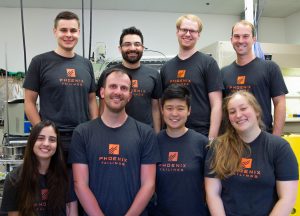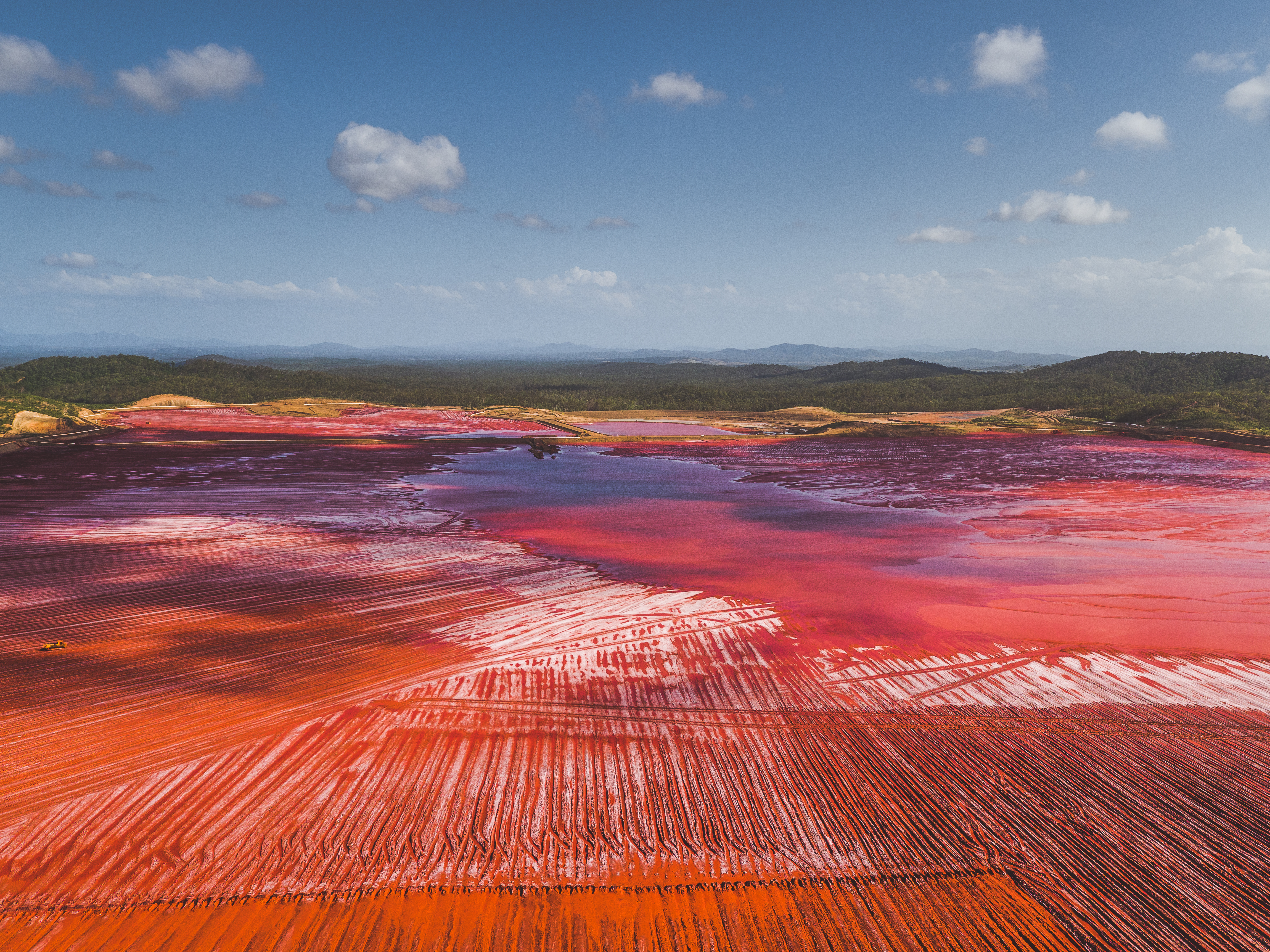They’re located all over the world.
They’re enormous lakes, but you’d never consider dipping a toe in.
They’re full of heavy metals, hazardous chemicals, and sludge.
And they smell really, really bad.
They’re called tailings ponds, and they’re a massive problem for both the environment and the mining industry that creates them. But a UConn-affiliated company is working to build a solution that not only could clean up some tailings ponds, it could turn the waste materials they hold into valuable, usable products.

“Phoenix Tailings is a company that really wants to revolutionize how we think about waste and is trying to change the industry on a fundamental level,” says Michael Martin ’17 (ENG), ’19 MENG, the company’s co-founder and vice president of operations. “We want to get to the point where there is no such thing as ‘waste’ and there is only material waiting to be processed into new products. To put it another way, we want to show people tailings ponds are a huge untapped opportunity.”
And they’re starting with tailings ponds full of bauxite residue – a thick, distinctively colored slurry, commonly called “red mud,” that’s produced after the mineral bauxite is processed to remove its most abundant component: aluminum.
“After they mine bauxite out of the ground, they bring it to a refinery and it goes through what’s called the Bayer process, where they extract the aluminum-containing material in the form of aluminum oxide,” Martin says. “It gets out a majority of the aluminum, but there’s still a bunch of stuff that’s leftover – iron oxide, silica, titanium, zirconia, and a whole bunch of other different materials, including rare earth elements, and some other hazardous chemicals that are involved in the Bayer process.”
Those leftovers get pumped into massive ponds, where the residue sits. And sits. And sits.
“Thirty-three million metric tons in a single site,” says Nick Myers, the CEO and co-founder of Phoenix Tailings, who has seen red mud tailings ponds, usually located near the mines, in person. “They cover a mile and a half, usually about 100 feet high, so there’s this toxic, stinky sludge just as far as your eye can see.”
The materials don’t degrade over time, Martin explains, and under current industry practices, red mud essentially remains in its ponds in perpetuity.
Aside from the very significant potential for spills and environmental damage due to leaks, seepage, or pond failures, the sheer amount of tailings produced each year by the mining industry is a major issue. For every ton of alumina produced in the manufacture of cars, cell phones, and other popular products, another ton of residue is created.
“A single mine produces a million tons a year of this sludge,” Myers says. “We need to find a way to solve the 173 billion metric tons of tailings that are produced every year – it’s enough to cover the entire state of California in a foot deep of toxic sludge every year.”
Enter Phoenix Tailings. The startup has developed technology that processes bauxite residue to extract its individual components, which can then be sold as materials to a variety of industries. The products from a single tailings pond would be worth many billions of dollars, the company says.
“One of the major constituents of bauxite residue is iron oxide, and you can make iron or steel out of that,” says Martin. “But one of the other huge applications for oxides is actually pigments. That’s one of the things that we’ve been actively researching, creating various colors, including very deep reds and yellows.”
While their process uses its own chemical compounds to extract the various components in the tailings, they’re also developing ways to recycle those chemicals, making their processes zero waste. They are currently able to produce small amounts of products from processed tailings, and are working now on prototyping their technology for larger scales.
Phoenix Tailings recently closed $1.35 million in seed funding, and they give a lot of credit to entrepreneurial programs at UConn for helping guide their fledgling company along the way. As part of the Accelerate UConn Fall 2018 cohort and the 2019 Summer Fellowship accelerator program, Martin and Myers immersed themselves in the learning, mentoring, and entrepreneurial development opportunities that UConn offers to students, alumni, and affiliates seeking to innovate and advance in their field.

“I think the ecosystem at UConn, hands down, has the absolute best support bar none over other programs,” says Myers. “It was so helpful, and I can’t speak highly enough about that. Just taking the time, as human beings, to coach us through something when we have absolutely no idea what we’re doing.”
Through Accelerate UConn, Myers and Martin were able to engage in significant customer discovery in order to focus in on the needs of their primary customers – the mines producing the tons of tailings each year. They honed the finer points of their business plan through UConn’s rigorous Summer Fellowship, and were the 2019 winners of the prestigious Wolff New Venture Competition.
“Wolff not only gave us the funds that we needed to actually build our first product,” says Myers, “but also the publicity from Wolff and the clout of winning Wolff is what got us into Techstars Boston, one of the world’s top startup accelerators. Out of 2,000 companies, ten were chosen for the program and we were the number one selected. That’s pretty cool.”
“Through Accelerate UConn and the Summer Fellowship, the leadership at CCEI – Jen Murphy and Michelle Cote – they really have built that program to be incredibly well-polished, and they’re still constantly asking how they can improve the process,” Martin says. “And they consistently ask the people that go through the program and people in industry, ‘What do you need to know and how can we do better?’ So, they have made that program what it is today, and it’s in no small part that where we are today is in thanks to them.”
While Myers and Martin say that Phoenix Tailings is still early in its development, they’re excited for the endeavor’s future and the positive response they’ve received thus far from both within and outside of the mining industry.
“Mining is an unsexy industry,” says Myers, “but mining affects everything. The metal that you have in your computer, your jewelry, even the coloring in your clothes, it all comes from mines, and today we’re throwing away over 90 percent of the material that we mine. That’s unreal.”
“We have a shared background in material science and engineering, and a shared passion toward cleaning up the environment and making the world a better place, and then also servicing industry and providing materials that they actually need,” Martin says. “So, we’re trying to create a solution everyone – mines and environmentalists, manufacturers and consumers – can get excited about.”
Phoenix Tailings is growing and actively looking people to join the team. To learn more about Phoenix Tailings and career opportunities, visit phoenixtailings.com.
For more information about entrepreneurship development, mentorship, and other opportunities available through UConn’s Connecticut Center for Entrepreneurship and Innovation, visit ccei.uconn.edu.



